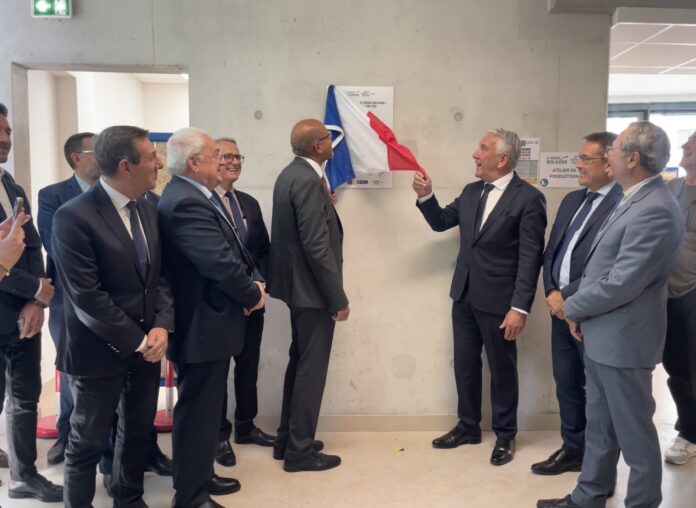At the Sud des Métiers campus in Nice, a unique educational venue was inaugurated. The Production School, as part of the second edition of the Spring Tech Industrie, an event organized by the Métropole Nice Côte d’Azur, aims to promote innovation and the local industrial renaissance.
In this school, there is no abstract curriculum, no lectures disconnected from reality. The focus is on young people, aged 15 to 17, who are often out of the traditional school system and nearly invisible to the conventional educational system. Here, they find a second chance. “We want these young people to feel at home, to have the right to a future, to the dignity of work,” says Jean-Pierre Dos Santos, the school’s president. He conveys a clear message: this school is not a last chance, it is another path, concrete and empowering.
In a 320 m² workshop, these adolescents work on real industrial orders, guided by professional masters. Far from being a simple educational simulation, these young people produce for real companies in the area. The model is clear “learning by doing,” a pedagogy supported by the National Federation of Production Schools, represented by Élise Dépré. “We learn a trade by living it,” she insists. She adds, “thus building self-confidence, brick by brick.”
Partner Companies, Strong Local Anchoring
The school isn’t an isolated island. It operates like a small business, an industrial start-up. The young people produce parts, some finished, others semi-finished, for local clients. For example, Ragni, a company specializing in aluminum, is one of the first industrial partners to entrust them with orders. These collaborations give meaning to the learning process. What the students manufacture is immediately useful.
Marcel Ragni, president of the UIMM Côte d’Azur and Sud-Corse and a local industry emblem, did not hide his emotion: “I fled school early. This school is a vindication for those like me who weren’t made for traditional classrooms. Thanks to the Chamber of Commerce and Industry (CCI), this project found a setting worthy of its ambition.”
Jean-Pierre Savarino, president of the CCI Nice Côte d’Azur, refers to a “structuring tool designed to bring young people closer to the economic world.” For him, this school is part of a broader strategy of industrial development and professional integration. “It is a decisive step for the employment of young generations in the Alpes-Maritimes.”
A CAP, and Above All, a Path to Dignity
After two years of training, the young people obtain a CAP (Certificate of Professional Competence) in electricity. A diploma, certainly, but also often a job. The model is based on apprenticeship, and students enter the labor market with solid practical skills. Some dropouts might directly obtain a permanent contract. The model relies on mixed funding: the state, the region, partner companies, and also the apprenticeship tax play a decisive role. The director of TotalEnergies, present at the event, reaffirmed the group’s commitment to this alternative educational model. “Today, 16% of young people in France are unemployed. If we want to reverse this trend, we must invest in these practical, useful, and effective structures.”
TotalEnergies thus finances equipment, tool purchases, but also the necessary human resources. The set goal is ambitious: 100 schools in France by 2028, and more than 2,000 young people trained each year through this network.
The School Off-Contract, but Not Out of the System
Although off the official contract, this school is not outside the realities of the educational world. It prepares students for a recognized diploma within a rigorous educational framework. Jean-Pierre Dos Santos states: “These young people come from afar. What they accomplish here is a human, technical, and collective achievement. They are no longer invisible. They build. They move forward. And we move forward with them.” A personalized support system is in place, and even the administration, often seen as a hindrance, benefits from support here. “Filing paperwork is sometimes complicated. Fortunately, we have assistance for this purpose. The aim is for the teams’ energy to remain focused on the young people,” comments a supervisor.
In this way, Nice aligns with a broader dynamic, the “Territories of Industry,” supported by the state and local authorities. The Spring Tech Industrie forum, held in parallel, highlighted the needs of the local industrial fabric for qualified manpower. It is within this logic that the opening of this school takes place, primarily to meet an immediate need while building a long-term vision.


